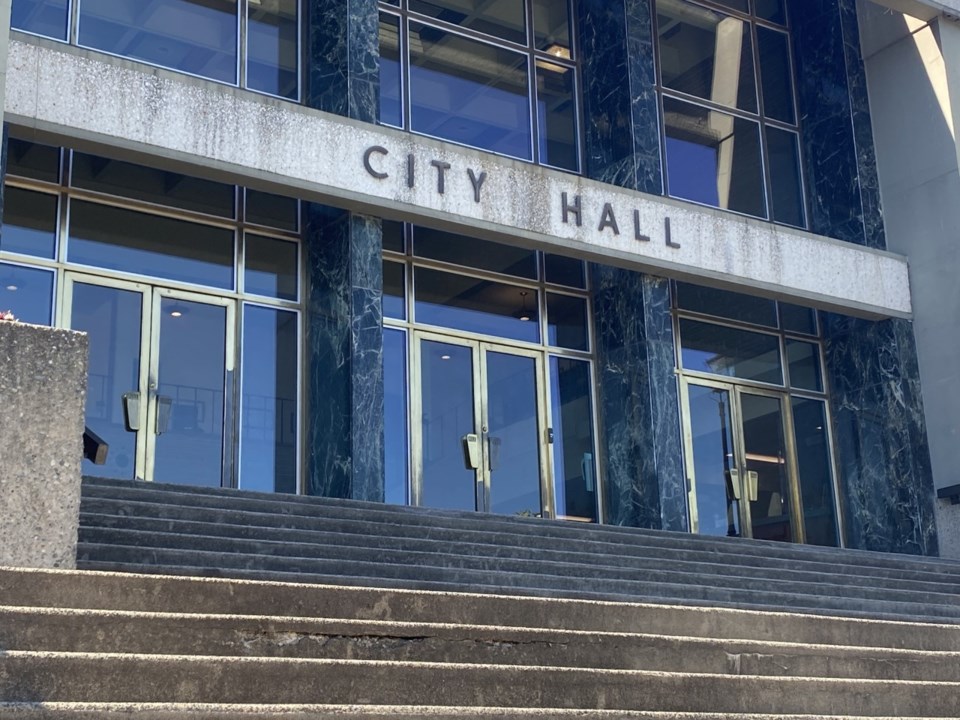British Columbia’s new housing legislation is resulting in changes to what folks can talk about in New Westminster city council chambers.
At its June 24 meeting, council considered changes to the council procedural bylaw. The changes are intended to mitigate the potential risk of being inconsistent with the Local Government Act.
In a 4-2 vote, council supported a staff recommendation that the council procedure bylaw be amended to prohibit delegations on land-use applications for which a public hearing is prohibited.
The staff report stated that Bill 44 amended the Local Government Act to prohibit local government from holding public hearings for rezoning application that are all or predominantly (greater than 50 per cent) residential, where the proposed rezoning is consistent with the local government’s official community plan.
A June 24 report to council outlined staff’s concerns about delegations to city council, given the new provincial legislation.
New Westminster city council’s regular meetings include an opportunity for the public to speak as delegations, where they can share their views on assorted issues.
“With the recent change in legislation by the province, staff have considered whether to permit such delegations before council related to a land-use bylaw for which a public hearing is prohibited, noting that there is a risk that this opportunity may be regarded as a de facto public hearing,” said the report. “As such, it is recommended that the council procedures bylaw be amended to mitigate this possibility.”
Staff say this means delegations to council won’t be permitted once the statutory notice is published 10 days prior to council consideration of first reading of a bylaw that prohibits a public hearing.
The staff report points out that members of the public can still submit written comments to council (by email or letter) for land-use bylaws where public hearings are prohibited. Folks can also engage directly with council on other matters in delegation period and at public hearings (for projects requiring an official community plan amendment or a heritage revitalization agreement).
“The way we do public delegations in New Westminster is one of the most open public delegation processes they have anywhere in the region, if not in the province, allowing essentially anyone to come and have their five minutes and speak on any item,” said Mayor Patrick Johnstone. “That has created a concern for staff that it might actually constitute a de facto public hearing and it might end up being an improper public hearing effectively.”
As a result of those concerns, Johnstone said staff recommended the city change its council procedures bylaw, so it aligns to the provincial regulations. He said the change brings New West into alignment with what’s being done in other cities having “relatively open” delegation processes.
“Staff did do a survey of other communities and how they're addressing this potential gap and recognize this could potentially put the city in some legal risk free if we do end up putting ourselves in a situation where we haven't responsibly followed the provincial regulations,” Johnstone said. “I see it as a prudent move to protect the city.”
Coun. Daniel Fontaine voted against the staff recommendation, saying he’d prefer that New Westminster continue to allow members of the public to be able to speak to council, rather than being shut down.
“I appreciate the concerns that staff have raised in the report. And I also appreciate that I think the risk is very low that having one person or two people come in as part of a delegation would somehow derail development. I think the risk is low,” he said. “But what I do believe is that by shutting down even more opportunities for the public to speak, it's just going in the wrong direction, from my perspective.”
Coun. Paul Minhas joined Fontaine in voting against the staff recommendation. Along with Johnstone, councillors Ruby Campbell, Tasha Henderson and Nadine Nakagawa supported staff’s recommendation.
“I think it's important that we follow good practice on this and don't put ourselves at risk of doing anything that might compromise these types of procedures,” Nakagawa said. “When people come to us with major projects, they've invested many, many years, quite often, to get it to the point of hearing it, and anything that may compromise our ability to hear it, I think we do have to follow practice on that.”
Resident pans plan
Christopher Bell, a longtime New West city council watcher, wrote to council and staff expressing opposition to the amendments to the bylaw.
“I am completely opposed to the suggested amendments as there is no way that a delegation of one or two persons speaking to the first, second and third readings of a proposed land use bylaw can be considered a public hearing where dozens may speak freely on a proposed land use bylaw,” he said in a letter to the city.
Bell said the Province of British Columbia describes a public hearing as a meeting where “all persons who believe that their interest in property is affected by the proposed bylaw must be afforded a reasonable opportunity to be heard.”
Bell countered that New Westminster city council’s delegation period is limited to 10 speakers who are chosen by the mayor, chief administrative officer, and the city clerk, so the commentary on a particular land use bylaw (where the public hearing is prohibited) “may be at most one or two people or groups.
“This small representation does not come close to approximating the numbers (dozens or hundreds of people) that may freely show up at a public hearing,” he wrote. “Please retain the small and limited democratic opportunity, that currently exists, for a citizen to speak to the potential impact of a land use bylaw prior to it being given three readings by council. There is no risk that a couple of people speaking to a proposed bylaw could be construed as a de facto public hearing.”





